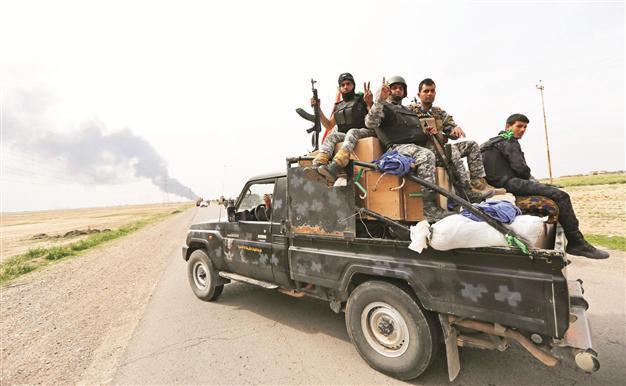Turkish military starts training missions in Iraq, Syria
Uğur Ergan ANKARA

REUTERS Photo
Turkish Special Forces are training Sunni forces in Iraq, as well as Turkmens in Syria, Turkish officials have confirmed.The training mission was first revealed by Asil Nujaifi, the governor of Mosul, in an interview with Anadolu Agency on March 15.
“Experts from Turkey are providing military training to our forces on the bases,” Nujaifi said. “Turkey is assuming a better role on this issue every day, but whether it will join the Mosul operation is related to the talks it will have with the coalition forces. It is very important that Turkey is involved in this operation.”
Turkish officials have confirmed Nujaifi’s remarks. Officials told daily Hürriyet that special forces, also known as the “Maroon Berets,” were providing training to Peshmerga forces in Arbil, as well as mostly Turkmen forces in Mosul and Kirkuk.
The officials also said Turkmen forces were being trained at a location inside Syria, which they did not want to name due to security concerns.
Last week, the Kurdish Regional Government (KRG) in northern Iraq announced that at least 16,000 Iraqi troops had been trained over the past four months to retake Mosul from the Islamic State of Iraq and the Levant (ISIL) militants.
The training provided by the Turkish military is focused on street clashes, sabotage and intelligence gathering. The sources declined to comment on the timing of the training and how many people will be trained, but said the training mission could soon be expanded to other parts of Iraq.
The Turkish Special Forces have so far provided training to more than 1,000 peshmerga members.
Authorities did not deny that the training mission was related to a looming operation to retake Mosul from ISIL.
Turkey is willing to support a possible operation to reclaim Mosul from ISIL, but it will avoid any direct combat unless it is attacked on its own soil, Prime Minister Ahmet Davutoğlu said March 4.
“We would support Mosul, but we will not engage in direct combat. We will only respond if there is a direct attack on Turkey. We possess both the potential and the might for that,” Davutoğlu told reporters, adding that Turkey would “back groups supported by the people” and considered Nujaifi to be the legitimate elected governor of Mosul.
Nujaifi also told the Anadolu Agency that Turkey also promised to send weapons.
“We demanded Turkey send weapons to our troops through Iraqi Prime Minister Haider al-Abadi and Iraqi Defense Minister Khaled al-Obeidi. We also expressed our military equipment demand to Turkish Defense Minister İsmet Yılmaz during his official visit in Iraq,” he said. “Turkish authorities have promised to send weapons to our forces receiving training, but we have not been given solid information on when, how and how much this aid will be.”
Expressing his criticisms regarding the central Iraqi government’s upcoming operation to retake Mosul, Nujaifi said Shiite militias acting with the Iraqi forces could cause problems.
“Sectarian forces from far regions could hurt the feelings of the Mosul people during the operation,” the governor said. “That is why we should prepare our forces as soon as possible and try to prevent other forces from joining in the operation.”
Nujaifi said Peshmerga forces would be included in the operation, but they did not want to enter the Mosul city center fearing “political consequences.”
The governor stressed that he could not yet give a specific date for the operation.
He also said the Iraqi government had come to an agreement with the Turkish government regarding the training of militia troops.
Iraqi security forces backed by Shiite militias launched a ground offensive against ISIL on March 2 to recapture Tikrit city, aiming to approach the ISIL stronghold of Mosul.
Tikrit, a Sunni-majority city, is the birthplace of former Iraqi leader Saddam Hussein.
















